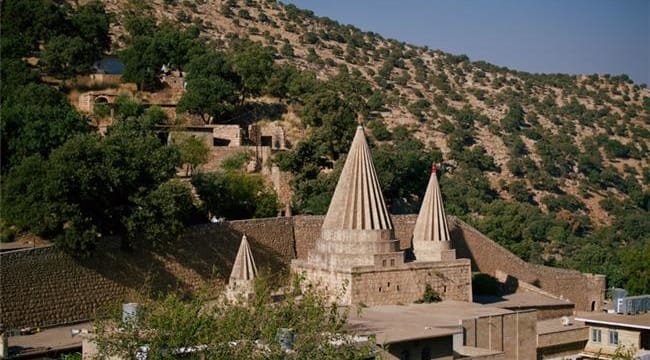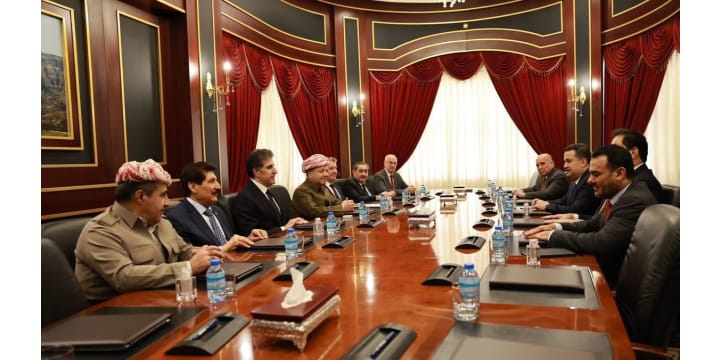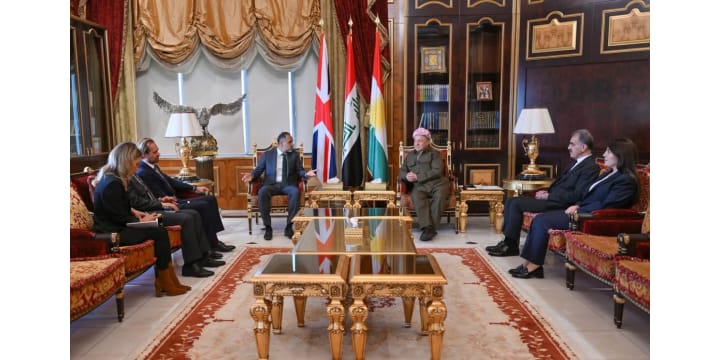
A brief summary on Yazidism
Yazidism is one the most ancient religious beliefs in the East and Mesopotamia Region. All its beliefs, supplications and religious text are in the Kurdish language. There is no doubt that Yazidis are the authentic part of the Kurdish Nation, who preserved the Kurdish heritage and literature through ideas, philosophy and beliefs.
The Yazidis believe in one creator, a monotheistic faith, and call him ‘Khude’ or ‘Ezdan’ and believe that all good and evil come from him, as indicated in this religious text, "Sultan Ezi is the king by himself, and he calls himself a thousand and one names, the greatest name remains Khude.” He is considered a passive force, the Creator of the world, not the preserver. Seven holy beings emanate from him of which the greatest is the Peacock Angel known as Malak Taus - active executor of the divine will.And the name Yazidi, E-Zi-Di, means those who follow the right path, which means ‘The Religion of the Truth’.
obligatory duties of truth and the obligatory duties of the tariqa (path).There are two basic pillars of the Yazidi religion, which are the
The obligations of truth are related to the Religious Caste System, and these classes are not social but religious, and there is a spiritual and religious relationship between them. They include the Sheikh, the main; Peer, the leader; Murabi, the instructor; Hosta, the teacher; and Birai A'khrate, the brother of Hereafter. As mentioned in this religious text, “The Sheikh is inevitable and the Peer is the essence, Hosta and Murabi both are just as important as both of them, the obligation of having the brother of Hereafter is a dire necessity, they are the five obligations of reality, they are dire needs for us the Yazidis, in this world and hereafter."
· Sheikh: a person from the Religious Class who is basically in charge of managing the administrative affairs of the religion, if necessary.
· Peer: a person from the Religious Class who is in charge of interpretation and clarification of religious matters and their communication to the public.
· Murabi: a person who can come from any class. His mission is personal education and encouraging the individual to do good.
· Hosta: a person whose role is teaching people about the religion besides social education.
· Birai Akhrate: a person that every male and female Yazidi has to choose to stay with him in this world and help him in the hereafter. This chosen person must be from a different class.
As for the obligations of the Tariqa (Path), these are in reference to the obligations that the Yazidis follow in practicing and approaching their religious rituals, such as:
1. Supplications and prayers: Fajr (dawn) supplications, supplications of dependence on God, morning supplications, sunset supplications, religious testimony supplications, and every Yazidi should give his religious testimony before falling asleep.
2. Fasting: Every Yazidi shall fast for three days to (Ezdan) and provide good deeds.
3. Male circumcision: It is carried out according to special rituals.
4. Pilgrimage to the sacred Lalish Temple, baptism with the water of Kania Spi (the white spring), and perform the rituals of the gathering (Jema). Other rituals include wearing the round collar around the neck with a tiny pocket beneath the collar containing a tiny ball made of the dust of the sacred Lalish Temple for self-protection.
Yazidism as a faith and throughout its history has been subject to many defamed attacks andheinous atrocities, as monuments and holy shrines destroyed, religious leaders and figures killed and followers endured extremely harsh circumstances. In turn, this has caused Yazidis to become immensely secretive. However, under the guise of fear and secrecy, inaccurate and baseless interpretations began to negatively affect the image of Yazidis and Yazidism. The parallel between the Peacock Angel and Satan, Muslims and Christians have accused Yazidis as devil worshippers. This is an example of a baseless claim because the concept of Satan does not exist in the Yazidi faith.
After the uprising of the Kurds in 1991, the Yazidis breathe a sigh of relief after the spread of freedom, equality and coexistence among all components in the Kurdistan Region. In 1993, a group of Yazidi intellectuals with the support of the local authorities founded Lalish Center in Dohuk City to convey to the world the accuracy of Yazidism.
The number of Yazidis currently reach about one million people in the world and the majority of them live in the Kurdistan Region of Iraq, which comprise about 680 thousand people with most of them living in the regions of Sinjar, Shekhan, Semel, Tilkif, Zakho and Bashiqa. In Syria the number exceeds 60 thousand people and in Turkey the number is estimated about 85 thousand people, but most have immigrated to Europe, with some in Iran. In addition, there are tens of thousands living in Armenia, Georgia and Russia, and other former Soviet Union countries, which total to an estimate at about 90 thousand people. The estimated number of Yazidis who migrated to Europe, USA, Australia and Canada is more than 150 thousand.
***
Shamo Qasim
Head of the Cultural Department at Lalish Center

